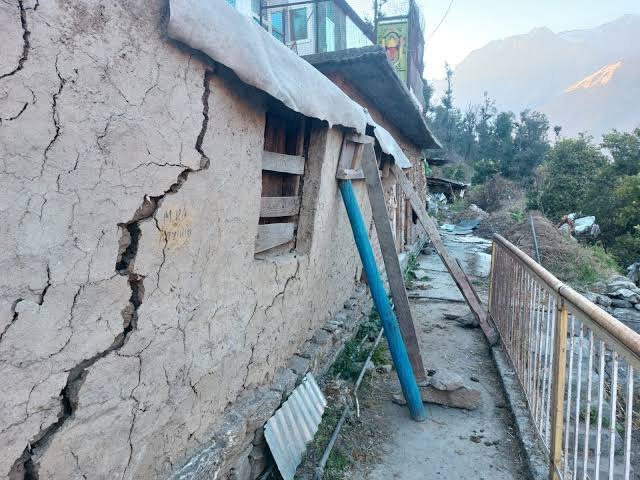New Delhi: Financial assistance should not be provided if the affected households in the subsidence-hit region of Joshimath in Uttarakhand do not have a valid land-ownership document or the buildings have been illegally encroached, a government report has recommended.
The report also recommended designating no-building zones in the land-use maps and denying any grant or relief to buildings constructed in such zones should there be a disaster.
Starting January 2, a number of houses and civil structures in an area located near Joshimath-Auli road began to display major cracks due to land subsidence, prompting the relocation of 355 families.

According to local residents, land subsidence had been noticed over several years but became increasingly severe from January 2 to January 8.
A 35-member team consisting of professionals from the National Disaster Management Authority, UN agencies, Central Building Research Institute, National Institute of Disaster Management, and other agencies conducted a “Post Disaster Needs Assessment” from April 22 to April 25 to assess the damage caused and to identify the assistance required for the long-term recovery and reconstruction of the affected sectors.
To prevent future disasters, the report emphasises the importance of proper documentation and compliance with building regulations.

“No financial assistance will be provided to the buildings illegally encroached and/or if the HH (household) does not have a valid land-ownership document,” the report said.
The agencies also highlighted the necessity of officially informing the people of Joshimath about the unsafe zones of the town, where no new construction should be allowed.
In terms of development and housing, the report recommended careful planning at the three relocation sites while viewing this process as an opportunity to expand tourism in the area.
It suggested creating a micro zonation map for landslides in Joshimath, which should also incorporate seismic and landslide vulnerabilities.

Building structures should align with the multi-hazard maps to ensure safety, it said.
“Designate the no-building zones in the land-use maps. Anyone building in the no-building zones will not be entitled to receive any government facilities (grants or reliefs) should there be a disaster,” the report read.
The report also highlighted the need for a mechanism to conduct structural health audits of existing buildings. This proactive approach can identify vulnerabilities and prioritize retrofitting efforts.

The report suggested implementing a town planning act and reducing the burden on Joshimath by regulating construction and creating open spaces. The transit population should also be managed to alleviate the town’s resources, it said.
With Joshimath serving as an economic hub, the report recommends decentralising economic activities to areas where rehabilitation is taking place. This move can distribute economic resources more equitably across the region and reduce the strain on Joshimath’s infrastructure.
The report said that local wisdom in resilient house building should be revived and made accessible through awareness campaigns.
PTI
